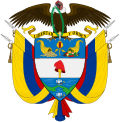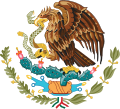History
Both nations are host to great indigenous cultures; the Aztecs and Mayas in Mexico and the Muiscas and Incas in Colombia. Colombia and Mexico both share a common history in that they were both colonized by Spain and each nation was the seat of power of one of four Spanish viceroyalties. Soon after gaining independence in 1821, the newly independent Mexican Empire and Gran Colombia once bordered each other in what are now the independent nations of Costa Rica and Panama. On 10 October 1821, Colombia recognized Mexico's independence when Simón Bolívar reached out with a message to the newly independent nation, therefore establishing diplomatic relations between both nations. [1] In 1822, Emperor Agustín de Iturbide named an ambassador to the Gran Colombia and in 1826, Mexico had a vice-consulate in Cartagena de Indias. [1] In 1831, both nations established resident embassies in their respective capitals. [2]
Since the establishment of diplomatic relations, both nations have become increasingly close politically and bilaterally. In 1989, both nations, along with Venezuela formed a trade bloc called the Group of 3 (Grupo de los Tres) which intended to reduce trade tariffs and create a free trade bloc between the three nations within a ten-year time span that took effect in 1995. However, in 2006, former President Hugo Chávez announced that Venezuela would be leaving the bloc due to his estranged relationship with former Mexican President Vicente Fox and former Colombian President Álvaro Uribe. The trade bloc continued without Venezuela until 2007. [3]
Over the past few years, both nations have become increasingly tangled in the war on drugs. Colombia has for many years been known as one of the biggest producers of drugs and for having notorious cartels. Mexico was traditionally a transit country for Colombia drugs to pass through en route to the United States (the largest demand market for drug consumption). However, Mexico has also become increasingly involved in drug production itself and many Mexican drug cartels have increasingly partnered with Colombian cartels in transiting drugs to other markets globally. Both the Colombian and Mexican government have increasingly worked together to combat the cartels and have hired advisers from each other nations to practice successful tactics in each other's nations respectively. [4]
Colombia and Mexico are two of the four founding members of the Pacific Alliance (the others being Chile and Peru). From 2017 to 2018, both nations celebrated a "Dual Year" in order to promote greater rapprochement among both nations, strengthen ties through activities in the areas of culture, education and academic mobility, trade and investment, entrepreneurship and innovation, among others, which were celebrated throughout two years. [5]
In July 2021, Colombian Vice-President and Foreign Minister Marta Lucía Ramírez, paid a visit to Mexico and met with her counterpart Marcelo Ebrard to reaffirm their commitment to strengthening both nations' joint bilateral relations mechanisms. [6] In 2022, both nations celebrated 200 years of diplomatic relations. [7] In November of that same year, Colombian President Gustavo Petro paid a visit to Mexico and met with Mexican President Andrés Manuel López Obrador. During the visit, Mexico was asked to and accepted the invitation to become a guarantor country in negotiations between the Colombian government and the National Liberation Army (ELN). [8]
In September 2023, Mexican President Andrés Manuel López Obrador paid a visit to Cali, Colombia to attend a Latin-American and Caribbean Conference on drugs. While in Colombia, Presidente López Obrador met with Colombian President Gustavo Petro and the two leaders discussed the ongoing peace process in Colombia. [9] In October 2024, President Petro travelled to Mexico to attend the inauguration of President Claudia Sheinbaum. [10] President Petro returned to Mexico in December 2024 and met with President Sheinbaum.. [11]
Transportation and Tourism
In 2022, over 700,000 Colombian citizens visited Mexico for tourism, making them the third largest group of visitors to Mexico (after the United States and Canada). That same year, 389,000 Mexican citizens visited Colombia for tourism. [15] There are direct flights between Colombia and Mexico with the following airlines: Aeroméxico, Avianca, Viva Aerobus, Volaris and Wingo.
Trade relations
Trade between the two nations has increased dramatically over the past ten years. In 2023, trade between the two nations totaled US$5.6 billion. [16] Colombia's main exports to Mexico include: coal, crude oil, instant coffee and automobile parts. Mexico's main exports to Colombia include: flat screen TVs, pure petroleum oil for tank-car, ship-tank or auto-tanks; corrugated rods or bars for reinforcement, for cement or concrete; shampoos; milk powder or pills; tequila and malt beer. [16]
Colombia is Mexico's tenth largest trading partner globally. [17] Colombian multinational companies such as Grupo Nutresa, Rappi and Terpel (among others) operate in Mexico. Mexican multinational companies such as Alsea, América Móvil, Grupo Bimbo, Cemex, Mabey, Orbia and Oxxo (among others) operate in Colombia.
This page is based on this
Wikipedia article Text is available under the
CC BY-SA 4.0 license; additional terms may apply.
Images, videos and audio are available under their respective licenses.











